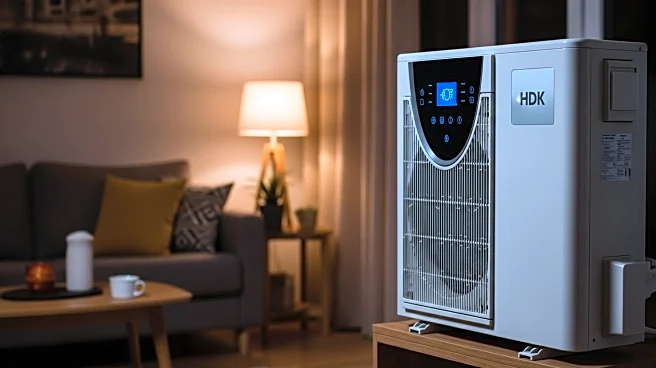What is the story about?
What's Happening?
A San Francisco-based startup, Quilt, has introduced a significant update to its two-zone ductless heat pump system, enhancing its heating and cooling capacity by over 20%. This update, released in September 2025, increased the indoor units' output to 12 kBtu for cooling and 12.6 kBtu for heating, while the outdoor compressor's capacity was boosted to 24,000 BTU/hr for cooling and 25,200 BTU/hr for heating. The update was delivered over-the-air (OTA), allowing existing systems to improve without hardware changes. Quilt's approach mirrors the software-defined vehicle model, where performance enhancements are delivered via software updates. This innovation is part of a broader trend towards smart, networked HVAC systems that integrate advanced sensors and algorithms to optimize performance.
Why It's Important?
The update by Quilt represents a shift in the HVAC industry towards software-defined systems, which can continuously improve over time. This approach not only enhances the performance and reliability of existing systems but also reduces the need for new hardware, making it a cost-effective solution for consumers. The increased efficiency and capacity of heat pumps are crucial for reducing energy consumption and carbon emissions, aligning with broader environmental goals. As heat pumps become more efficient, they offer a viable alternative to traditional gas furnaces, contributing to the decarbonization of buildings. This development is significant as it supports the transition to more sustainable energy solutions, potentially reducing energy costs and environmental impact.
What's Next?
Quilt's update is expected to influence the HVAC market by encouraging other manufacturers to adopt similar software-defined approaches. As states like California and Colorado push for higher adoption rates of heat pumps, the demand for efficient and adaptable systems is likely to grow. Regulatory changes, such as the shift to low-global-warming-potential refrigerants, will further drive innovation in the industry. Quilt plans to continue enhancing its systems with future updates, potentially introducing new features and efficiency optimizations. This ongoing improvement could lead to wider adoption of heat pumps, supporting efforts to meet climate targets and reduce reliance on fossil fuels.
Beyond the Headlines
The move towards software-defined HVAC systems raises considerations around cybersecurity and data privacy, as connected devices must be protected against potential threats. Additionally, the transition to more advanced systems may require updates to safety codes and regulations to accommodate remote performance alterations. The broader adoption of heat pumps also highlights the need for equitable access to these technologies, ensuring that all households can benefit from energy savings and improved comfort. As the industry evolves, addressing these challenges will be essential to fully realize the potential of smart, sustainable HVAC solutions.















